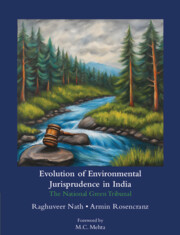Book contents
- Frontmatter
- Dedication
- Contents
- List of Images
- Foreword
- Preface
- Acknowledgements
- List of Abbreviations
- 1 Introduction to the National Green Tribunal: The Need for a “Green Court”
- 2 The National Green Tribunal Act, 2010: Analysis and Interpretation
- 3 Interpretation and Application of Environmental Principles
- 4 Evaluating the National Green Tribunal after a Decade: Challenges to Overcome
- Interview with Justice Swatanter Kumar
- Interview with Vimal Bhai
- Index of Cases
Foreword
Published online by Cambridge University Press: 15 January 2025
- Frontmatter
- Dedication
- Contents
- List of Images
- Foreword
- Preface
- Acknowledgements
- List of Abbreviations
- 1 Introduction to the National Green Tribunal: The Need for a “Green Court”
- 2 The National Green Tribunal Act, 2010: Analysis and Interpretation
- 3 Interpretation and Application of Environmental Principles
- 4 Evaluating the National Green Tribunal after a Decade: Challenges to Overcome
- Interview with Justice Swatanter Kumar
- Interview with Vimal Bhai
- Index of Cases
Summary
In the annals of India's legal history, the journey of environmental jurisprudence stands as a testament to the country's evolving consciousness and commitment towards preserving its natural heritage. Tracing its evolution through the decades, thus, becomes vitally important in not just understanding the pulse of India's evolving environmental paradigm but also in assessing the direction in which it is heading.
My own journey in environmental law, marked by relentless legal battles, has been driven by a deep-seated belief in the power of jurisprudence to safeguard our natural world. The establishment of environmental tribunals in India, a direct consequence of these legal battles, symbolizes a shift in the Indian judicial paradigm – a shift aimed at moving from reactive measures to proactive environmental governance. The National Green Tribunal (NGT), in particular, was established to be an embodiment of this transformation, serving as a specialized body to address the complex and urgent environmental challenges facing our nation. However, even after more than a decade of the Tribunal's establishment, the general dearth of comprehensive literature on the NGT has often hindered a deeper understanding of its functions, challenges, and impacts.
The authors, Raghuveer Nath and Armin Rosencranz, have done commendable work in filling this significant void in the literature on environmental jurisprudence in India. Their book, Evolution of Environmental Jurisprudence in India: The National Green Tribunal, provides nuanced insights into the NGT's formation, functioning, and the challenges it is yet to overcome. In a country where environmental issues are as diverse as its ecology, the need for such comprehensive academic work cannot be overstated. It offers a reservoir of knowledge for practitioners, academicians, policymakers, and students alike.
Perhaps, one of the most important aspects of this work is that it allows the reader to situate the present environmental legal trends within the larger context of India's environmental jurisprudence. For instance, the three most important environmental law principles – polluter pays, precautionary principle, and sustainable development – have undergone significant changes over the last few decades. The book highlights how these principles have been historically evolved and deployed with varying standards depending on the circumstances of different cases. In doing so, it allows the reader to navigate through internal legal contradictions and helps them to contrast the NGT's adjudication with that of the Indian Supreme Court and international environmental law.
- Type
- Chapter
- Information
- Evolution of Environmental Jurisprudence in IndiaThe National Green Tribunal, pp. xi - xiiPublisher: Cambridge University PressPrint publication year: 2025

